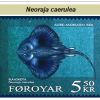Missatges: 15
Llengua: English
ryanpg (Mostra el perfil) 6 de novembre de 2013 16.47.55
Stumbled upon a proposed variaĵo de Esperanto - a so-called "reform" called "Esperanto sen fleksio". Most of the "reforms" that Harrison, its creator, proposes I strongly disagree with. However, there is one thing he proposes that I think makes perfect sense - especially in the Internet age. He proposes using W to represent Ŭ.
It has already become quite common to represent diarectic marks by adding an "X" after the letter. Before the internet age some people added an "h". But I think X makes more sense as this is a letter that does not exist in Esperanto so it would help prevent confusion. Likewise, W is also a letter not found in Esperanto and I think it makes perfect sense to use it to represent Ŭ when one is using a standard keyboard.
Again, I want to stress I disagree with most of the proposed reforms in "Esperanto sen fleksio" - but - there is an Usona Proverbo "A stopped clock is right twice a day." What are your thoughts?
If you are curious about "Esperanto sen fleksio":
http://eo.wikipedia.org/wiki/Esperanto_sen_fleksio
Thanks,
Rajano
Nile (Mostra el perfil) 6 de novembre de 2013 17.21.15
It makes sense to me that it would have its own letter, seeing as the non-syllabic I got its own letter in J.
tommjames (Mostra el perfil) 6 de novembre de 2013 17.28.11
But really, why do we need another way of representing Ŭ? The problem of entering accented characters has been solved with Unicode. Better to discard the cr*ppy old software that only understands ASCII and antiquated code-pages than cling onto these ugly representation schemes, IMO.
Having said that, using W on the keyboard for Ŭ seems ok to me and Tajpi has an option for this.
bartlett22183 (Mostra el perfil) 6 de novembre de 2013 18.34.54
 I was one of those people who strenuously subscribe to the "Big Three" objections to Esperanto, one of which is the supersigned letters. Then I simply decided to "get with the program." Many/most(?) modern computer systems handle Unicode transparently under the covers and already have fonts (for both display and printing hard copy) with the E-o supersigned letters.
I was one of those people who strenuously subscribe to the "Big Three" objections to Esperanto, one of which is the supersigned letters. Then I simply decided to "get with the program." Many/most(?) modern computer systems handle Unicode transparently under the covers and already have fonts (for both display and printing hard copy) with the E-o supersigned letters.For MS Windows, at least, and I presume some other operating systems as well (Mac and Unix/Linux), there are programs almost trivially easy to install and trivially easy to use which make it duck soup to enter the characters almost transparently and with a simple extra keystroke (as many non-English character sets already require). Once I made up my mind, I expended maybe, oh, an outrageously burdensome fifteen minutes of time and effort to get set up. Since then, on those rare occasions when I need to do so, it is actually easier and quicker for me to enter the E-o letters than it is to enter letters for languages using the ISO Latin-1 (west European) characters.
kaŝperanto (Mostra el perfil) 6 de novembre de 2013 19.14.02
On the other proposed features, I don't agree that we should simplify the language for everyone because a few languages don't have the same features (it's already common to use only simple forms unless absolutely necessary). It's also against the spirit of esperanto to rely on context to determine things, IMHO.
bartlett22183:Long, long ago in a galaxy far, far awayUnicode is definitely the future. Esperanto is actually an included feature on Ubuntu Linux. I just add Esperanto to my list of layouts and map a key combo to switch between them. The only downside is that most of them use Alt plus something, which brings up the HUD if you use Unity. I just press Alt+space and switch at will. I think Ubuntu also has Esperanto as a system language, but I have yet to use it.I was one of those people who strenuously subscribe to the "Big Three" objections to Esperanto, one of which is the supersigned letters. Then I simply decided to "get with the program." Many/most(?) modern computer systems handle Unicode transparently under the covers and already have fonts (for both display and printing hard copy) with the E-o supersigned letters.
For MS Windows, at least, and I presume some other operating systems as well (Mac and Unix/Linux), there are programs almost trivially easy to install and trivially easy to use which make it duck soup to enter the characters almost transparently and with a simple extra keystroke (as many non-English character sets already require). Once I made up my mind, I expended maybe, oh, an outrageously burdensome fifteen minutes of time and effort to get set up. Since then, on those rare occasions when I need to do so, it is actually easier and quicker for me to enter the E-o letters than it is to enter letters for languages using the ISO Latin-1 (west European) characters.
Even my phone's keyboard (Messagease FYI) allows easy use of accented characters.
marcuscf (Mostra el perfil) 6 de novembre de 2013 19.28.13
Mustelvulpo (Mostra el perfil) 6 de novembre de 2013 21.44.41
But if you somehow find yourself in such a situation, in the case of ŭ, I'd just leave it as u. (Of course, it would be necessary to use some method of indicating the other ĉapelitaj literoj.) I'm having a hard time thinking of any words where there could be confusion. Most people would know that lau means laŭ, antau means antaŭ, fraulo means fraŭlo, etc. In fact, I'm beginning to wonder if the mark above the u is really all that necessary.
Fenris_kcf (Mostra el perfil) 7 de novembre de 2013 0.14.28
"Mustelvulpo":In fact, I'm beginning to wonder if the mark above the u is really all that necessary.I don't think that necessity is the measurement to use here. The thing is, that one would no longer be able to determine the correct pronounciation of an Esperanto-word containing "au" just by it's writing. Though i admit, that it is hard to find a word containing "au" instead of "aŭ", i have to assess, that it would be a step away from phonologic consistency.
IMO using "w" instead of "ŭ" is not a big deal and it would make typing easier for a lot of people. However there ain't no institution, that has the power or will to make such an "adjustment" official; at least not, when only a few use it and i'm quite sure, that if you'd made a poll through a representative number of Esperantists whether to make the ŭ→w-replacement official or not, more than the half (probably significantly more) of'em would vote "no" (though for different reasons).
Bemused (Mostra el perfil) 7 de novembre de 2013 3.50.30
bartlett22183:Long, long ago in a galaxy far, far awayInteresting, so what are the other two big objections?I was one of those people who strenuously subscribe to the "Big Three" objections to Esperanto, one of which is the supersigned letters.
Are those objections unique to speakers of English, or are they shared with speakers of other languages?
Fenris_kcf (Mostra el perfil) 7 de novembre de 2013 8.12.55
Vespero_:I think that one of the main reasons Ŭ is used instead of W is that W is a consonant and Ŭ acts as a semi-vowel. Except in exclamations, Ŭ never starts words.A letter itself can't be classified as a consonant, vowel or semi-vowel. It's the mapping to a sound that decides. The Esperanto "ŭ" maps to the semi-vowel [w] just as the English "w" does (in most cases). So this replacement would even bring the orthography of Esperanto closer to IPA.








